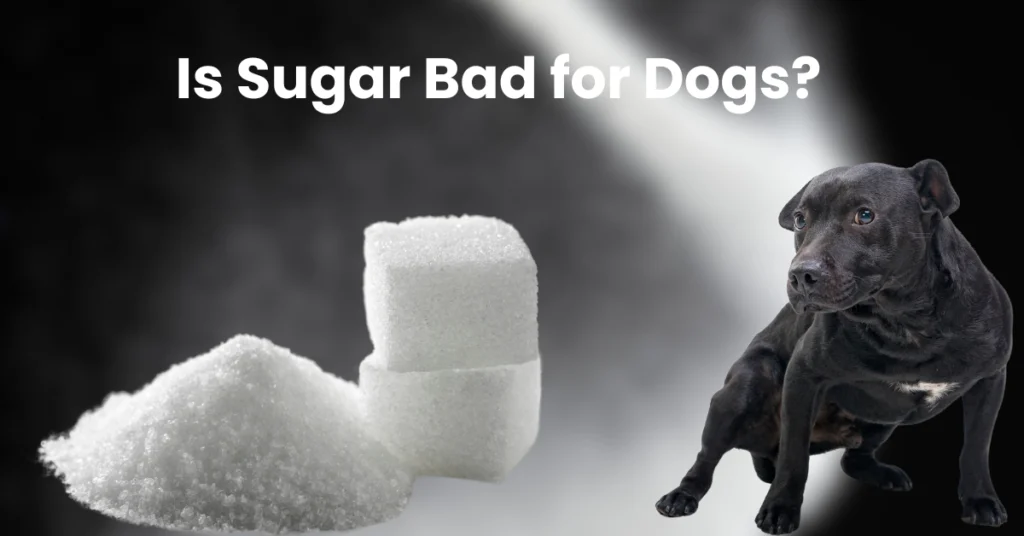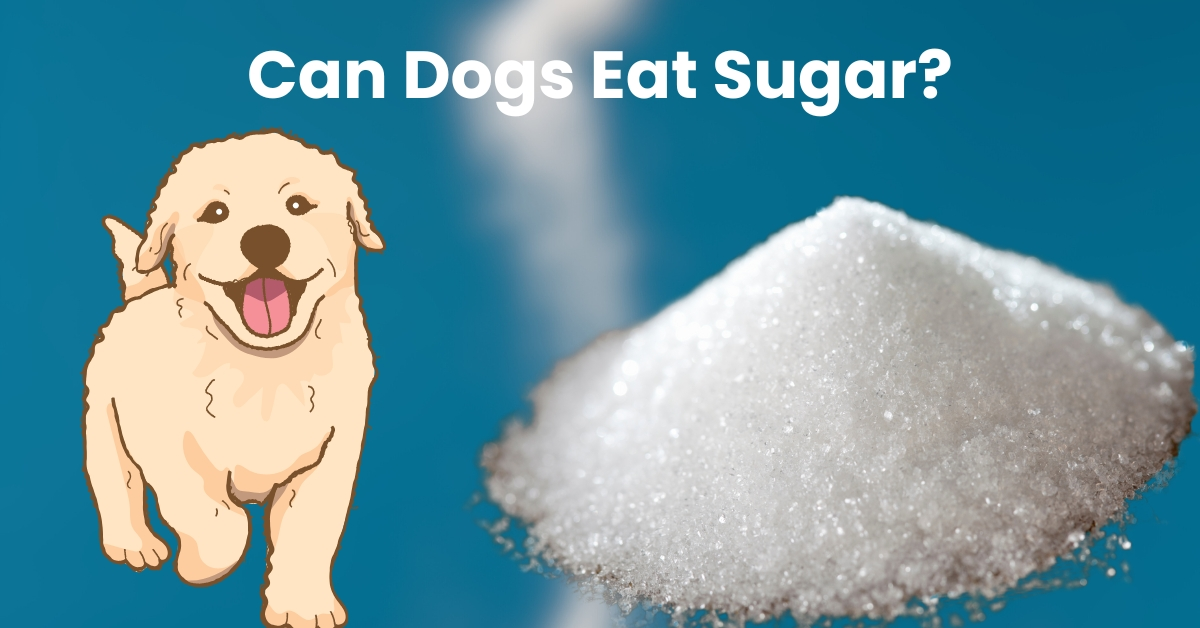Can Dogs Eat Sugar?
When introducing new foods to your dog, it’s crucial to consult with your veterinarian first. Factors such as your dog’s age, health history, and dietary restrictions can significantly influence what is safe for them to eat. Can Dogs Eat Sugar? This is especially important for dogs on prescription diets, as they should not be given any treats or foods outside of their specified regimen.
While natural sugars found in fruits might seem harmless compared to processed sweets, it’s essential to be cautious. Although sugary foods are generally not healthy for dogs, occasional small amounts of fruit can be acceptable. However, brown sugar should be avoided altogether, as it can lead to weight gain and other health complications if consumed regularly. Feeding dogs table scraps is a common temptation, but many human foods can be harmful or even dangerous for pets. It’s vital to evaluate the suitability of any new food item before sharing it with your furry companion.

Is Sugar Bad for Dogs?
Sugar is not toxic to dogs, but it poses several health risks when consumed in excess. While occasional small amounts of dog-safe fruits are generally safe, a high-sugar diet can lead to issues such as obesity, metabolic changes, diabetes, and even pancreatitis over time. It’s important to limit treats to no more than 10% of a dog’s total diet, with the remaining 90% coming from a portion of balanced dog food.
Certain substances, like chocolate and xylitol, are highly toxic and can be life-threatening to dogs. Chocolate, in particular, contains methylxanthines, which can cause serious health problems, including vomiting, seizures, and even death, especially in larger quantities. Darker chocolates are more dangerous than lighter varieties, making it crucial to keep all chocolate away from pets.
While dogs can enjoy some fruits and vegetables, processed sugars, including brown sugar, provide no nutritional benefits and should be avoided. Dogs are not as sensitive to salt, but excessive sugars can lead to significant health complications, making moderation and careful selection of treats essential for their well-being.
Can Dogs Have Other Sugars and Sugar Substitutes?
Feeding your dog brown sugar can have serious health implications, particularly if they consume it in large quantities. This high-calorie ingredient is devoid of nutritional value and can lead to pancreatic inflammation, known as pancreatitis. The threshold for what constitutes “too much” varies based on factors like the dog’s size, age, and overall health. Symptoms of pancreatitis can appear within 48 hours and include vomiting, lethargy, and loss of appetite, making it crucial to consult a veterinarian if you suspect your dog has ingested a significant amount.
For context, a single packed teaspoon of brown sugar contains around 17.5 calories, which may seem minimal but is substantial when considering a small dog’s daily caloric needs. For instance, a 10-pound dog typically requires about 275 calories per day, meaning that one teaspoon could account for a considerable portion of their treat allowance. Opting for treats with genuine nutritional benefits is far more beneficial, ensuring your dog feels satisfied without the risks associated with sugary snacks.
Can Dogs Eat Candy and Lollipops?
Keeping your dog away from candy and sweets is essential for their safety. While sugar itself isn’t toxic to dogs, many candies contain harmful ingredients like xylitol, chocolate, raisins, or nutmeg. Xylitol, an artificial sweetener often found in “sugar-free” products, poses a severe risk. Even small amounts can lead to fatal consequences by causing a rapid drop in blood sugar or irreversible liver damage.
Chocolate also presents a significant threat to dogs due to its caffeine and theobromine content. These compounds can negatively affect a dog’s cardiovascular, respiratory, and nervous systems, potentially leading to dehydration. The severity of chocolate toxicity depends on the dog’s weight and the type of chocolate consumed. For instance, while a 100g piece of milk chocolate may not harm a 50-pound dog, the same amount of dark chocolate could require immediate veterinary intervention due to its higher theobromine concentration. Always be vigilant to ensure your furry friend stays away from these dangerous treats.
Is Corn Syrup Bad for Dogs?
Corn syrup may not be toxic to dogs, but its high sugar content poses significant health risks, especially with repeated consumption. Over time, excessive intake can lead to obesity and diabetes. If a dog occasionally licks up a small amount of brown sugar, it typically won’t cause harm. However, if a significant quantity is consumed, it’s advisable to consult a veterinarian.
Consuming large amounts of sugar can result in immediate digestive issues like diarrhea and vomiting. Chronic sugar consumption may contribute to more serious problems, such as weight gain, pancreatitis, and even tooth enamel weakening. While carbohydrates like brown sugar do provide necessary glucose, a dog’s macronutrient preferences lean heavily towards protein and fat. A study revealed that dogs often prefer a diet with 30% protein, 63% fat, and only 7% carbohydrates, highlighting their unique nutritional needs and sensory preferences.
What About Sugar Water for Dogs and Puppies?
While some might suggest using sugar water to address hypoglycemia in dogs, veterinarians do not endorse this practice. Instead, they recommend providing a high-protein meal to stabilize blood sugar levels. On a related note, if a dog consumes a large amount of brown sugar, it could risk developing pancreatic inflammation, with severity depending on the dog’s size, age, and overall health. Symptoms of pancreatitis, such as vomiting, lethargy, and loss of appetite, can appear within 48 hours, so prompt veterinary care is crucial.
It’s essential to monitor your dog’s hydration and to inform the veterinarian about the amount of sugar ingested. Additionally, pet owners should be aware that chocolate is highly toxic to dogs due to its content of theobromine and caffeine. Ingesting chocolate can result in serious symptoms, including vomiting, rapid breathing, increased heart rate, seizures, and potentially fatal outcomes.

Do Dogs Like Sweets?
Dogs do have taste buds and can indeed perceive sweet flavors, although they have significantly fewer than humans—1,700 compared to our 9,000. Despite this difference, dogs possess the same taste receptors for spicy, sweet, bitter, sour, and salty flavors. Interestingly, while they tend to shy away from bitter or sour tastes, many dogs are drawn to sweetness. This preference may explain their fondness for fruits and vegetables, as well as their curiosity when humans indulge in sugary treats like cookies or candy.
How Much Sugar Can a Dog Have?
When incorporating sugar into your dog’s diet, it’s essential to ensure that any sugar from dog-safe fruits does not exceed 10% of their overall intake. Additionally, including vegetables can provide nutritional balance without the added sugar. However, if your dog consumes plain sugar, sugary treats, or candy, they may suffer from gastrointestinal issues such as upset stomach, gas, bloating, vomiting, or diarrhea, which can sometimes be severe.
Dog owners need to be vigilant, as many foods contain hidden sugars labeled under various names, ultimately contributing to a high-sugar diet. Keeping your dog’s sugar consumption in check is crucial for their overall health and well-being.







